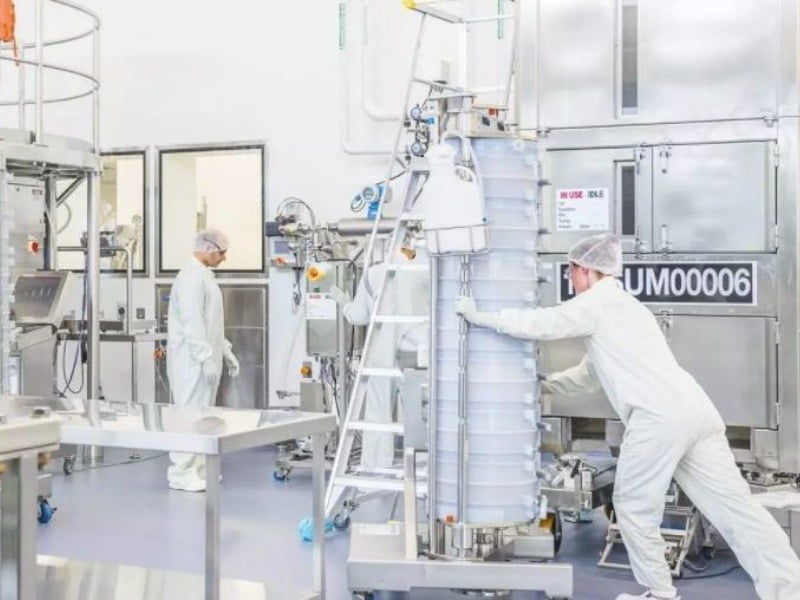A report on the development of onshore mRNA vaccine manufacturing capabilities that the federal government paid McKinsey $2 million to write and is driving its push for a local facility will be kept secret from the public.
The contract for this business case was also not posted publicly until more than a month after it was completed, against the government’s own procurement rules.
Late last week the industry department opened an expression of interest (EOI) process for the establishment of a local mRNA vaccine manufacturing capability, with manufacturers, other companies and state governments invited to present a fully-costed blueprint.
It came after last year’s MYEFO (mid-year economic and fiscal outlook) update included an undisclosed amount of funding to develop a business case for this process.
On Christmas Eve last year, the government awarded McKinsey a $2.2 million, three-month contract to provide “professional advice” on this business case.
But the contract details were not posted publicly on the AusTender website until mid-April, after the report had already been completed and well after the 42-day deadline that government procurement rules require.
A spokesperson for the department said this was due to an “administrative oversight”.

“Procedures have been reviewed to safeguard against this happening again. To ensure this does not happen again there will be additional procurement training, escalation of reporting reminders to senior staff and the automation of reminders,” the spokesperson told InnovationAus.
The spokesperson also confirmed that this business case for a local mRNA capability will not be released to the public.
“Given the commercial information in the business case, and that it is contributing to the government’s deliberations, it will not be released publicly,” the spokesperson said.
The business case also won’t be made available to parties responding to the government’s EOI on the matter.
This month’s federal budget included funding for the development of an onshore mRNA vaccine manufacturing capability, but the exact dollar amount has been kept secret due to “commercial in confidence sensitivities”.
Through the EOI, the government is looking for fully-costed proposals to establish the manufacturing capability, which can be fully operational no later than three years after an agreement is signed.
Industry minister Christian Porter said the business case presented by McKinsey revealed the “desirability and potential” of developing mRNA vaccines in Australia.
“We know that mRNA is an extremely promising branch of medical science and we know from work already undertaken that Australian businesses and researchers are developing mRNA capacity,” Mr Porter said.
“However, our market analysis also shows that there are gaps and challenges to scale-up, which means it’s not currently possible to commercially manufacture mRNA treatments locally.”
The government has adopted a “two-pronged approach” to the task, continuing discussions with existing manufacturers and also approaching the market for other proposals, Mr Porter said.
And the EOI documents make it clear that it’s possible no funding will result from the process.
“There is no guarantee that this process will result in the Australian government undertaking any grant, procurement activity or other financial support for any proposal that involves any respondent to this approach to market,” the EOI documents said.
“The Australian government may not undertake any open procurement or grant process following this approach to market and may seek to enter into arrangements directly with one or more respondents to this approach to market or with any other entity.”
Respondents to the EOI won’t have access to the business case developed by McKinsey or get any insights into the amount of money the federal government has set aside for the significant task.
“Given the inherent commercial nature of this process we are not publishing funding information associated with establishing an onshore mRNA manufacturing capability. We are asking for proposal submissions that are fully costed to enable the Australian government to make an informed decision about how to secure the best mRNA capability for Australians,” it said.
Tender rules will be bypassed in the process as it is “necessary to protect public health”, while the government may also opt to not actually go through a procurement process and instead just award a grant to a company or consortium to build the capability.
The government’s focus on mRNA vaccine manufacturing was welcomed by CSL, which is currently manufacturing the AstraZeneca vaccine in Australia. The company said its vaccine business, Seqirus, has been researching mRNA vaccines for “several years”.
“We look forward to continued collaboration with the government on how mRNA vaccine technology might be delivered to Australia,” Seqirus senior vice-president of research and development Dr Russell Basser said.
In its own budget, the Victorian government committed $50 million to support the manufacturing of mRNA vaccines in the state. The state government will also have to go through the Commonwealth’s EOI process as it looks to establish a facility in Victoria.
Do you know more? Contact James Riley via Email.

